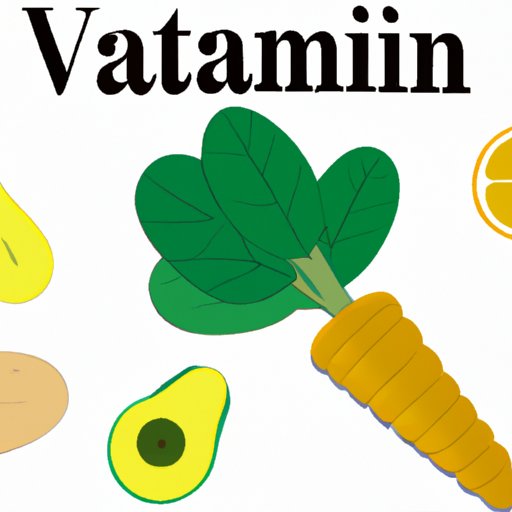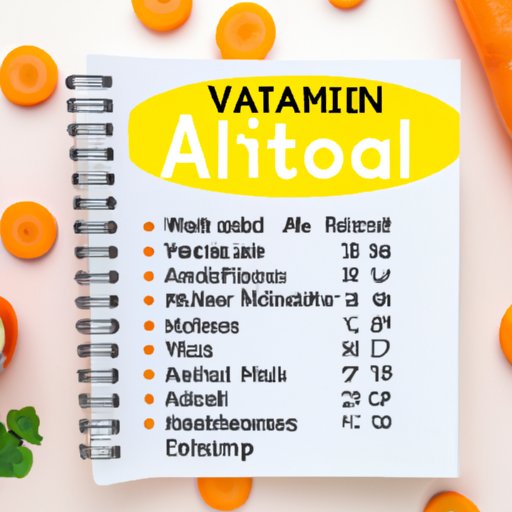
Introduction
Vitamin A is an essential nutrient that plays a crucial role in maintaining good health. It is necessary for strong bones, vision, immune function, and cell growth. While Vitamin A is widely available in many foods, it is crucial to know which foods provide the best sources of this vital nutrient.
This article aims to provide a complete guide to Vitamin A. We will explore the benefits of Vitamin A, its sources, and its importance in our diet. Along the way, we will provide tips for incorporating more Vitamin A-rich foods into your meals.
Why Vitamin A is Essential for Your Health & Where to Find it
Vitamin A is a nutrient that is essential for maintaining good health. It is necessary for a wide range of bodily functions, including vision, immune function, and cell growth.
In terms of its health benefits, Vitamin A is crucial for supporting healthy eyesight, especially in dim lighting. It also plays a significant role in maintaining healthy skin and mucus membranes.
When it comes to getting enough Vitamin A in your diet, the best sources are found in foods such as dairy products, liver, and fish. However, it is also possible to find smaller amounts of Vitamin A in fruits and vegetables, such as carrots, sweet potatoes, and leafy greens.
Discover the Top 5 Foods High in Vitamin A
Here are the top 5 foods that are high in Vitamin A:
- Eggs: Eggs are a nutrient-dense superfood that provides many essential nutrients, including Vitamin A.
- Cheese: Cheese is another excellent source of Vitamin A.
- Sweet Potatoes: Sweet potatoes are a great source of Vitamin A, and they also provide a healthy dose of fiber.
- Carrots: Carrots are a popular vegetable that is rich in Vitamin A. They can be enjoyed raw or cooked and can be incorporated into a variety of dishes.
- Spinach: Spinach is a leafy green vegetable that is rich in nutrients, including Vitamin A. It can be added to salads, smoothies, and a variety of cooked dishes.
These foods are easy to incorporate into your daily diet. For example, boiled eggs can be enjoyed as a snack, while sweet potatoes can be baked, roasted, or mashed and enjoyed as a side dish. Carrots can be eaten raw as a snack, or cooked and added to dishes such as soup or stew.
A Complete List of Foods That Contain Vitamin A
Here is a comprehensive list of foods that contain Vitamin A, broken down by food groups:
Dairy and Dairy Alternatives:
- Whole milk
- Butter
- Cheese (cheddar, mozzarella, and blue cheese)
- Ricotta cheese
- Yogurt
- Fortified almond milk
Fruits and Vegetables:
- Carrots
- Sweet potatoes
- Pumpkin
- Squash
- Kale
- Collard Greens
- Spinach
- Butternut squash
- Apricots
Meat and Poultry:
- Beef liver
- Chicken liver
- Pork liver
- Chicken breast
- Pork chops
- Beef roast
Seafood:
- Cod liver oil
- Salmon
- Tuna
- Trout
- Oysters
It is important to note that Vitamin A can be toxic in large amounts. Therefore, it is crucial to consume Vitamin A in moderation and choose a variety of foods that contain this essential nutrient.

The Ultimate Guide to Finding Vitamin A in Your Diet
Vitamin A is available in several different forms. Here’s where you can find them in your diet:
Retinoids
Retinoids are found in animal products such as liver, fish, poultry, and dairy. They are readily absorbable and contribute to the body’s Vitamin A stores.
Carotenoids
Carotenoids are found in plant foods such as fruits and vegetables. They are converted to Vitamin A in the body, but the conversion rate is lower than with retinoids.
When it comes to finding Vitamin A in your diet, it is crucial to read nutrition labels and choose foods that are high in Vitamin A. It’s also essential to include a variety of foods that contain both retinoids and carotenoids in your diet.
How to Incorporate Vitamin A into Your Daily Meals
Incorporating Vitamin A into your diet is easier than you think. Here are some practical ideas for how to add more Vitamin A to your meals throughout the day:
Breakfast:
- Make a Veggie Omelet: Add spinach, mushrooms, and tomatoes for a boost of nutrients.
- Whip Up a Smoothie: Add kale, carrots, and oranges to a blender for a quick and convenient breakfast that is loaded with Vitamin A.
Lunch:
- Make a Salad: Mix kale, spinach, and shredded carrots and top with a protein of your choice.
- Try a Stuffed Sweet Potato: Fill a baked sweet potato with black beans, avocado, and quinoa.
Dinner:
- Grill Some Salmon: Salmon is a great source of Vitamin A and can be enjoyed as a delicious and healthy dinner option
- Make a Chicken and Vegetable Stir-Fry: Stir-fry chicken breasts and broccoli with garlic and ginger for a tasty and nutritious meal.
Exploring the Best Sources of Vitamin A for Optimal Health
When it comes to getting the most benefits from Vitamin A, it’s essential to choose foods that are the most effective sources of this nutrient. Here are some of the best sources of Vitamin A:
Retinol:
Retinol is the most bioavailable form of Vitamin A and is found in animal products such as liver, dairy, and eggs.
Beta-Carotene:
Beta-carotene is a carotenoid that is found in plant foods such as carrots, sweet potatoes, and leafy greens. They are converted to Vitamin A in the body, making them an excellent source of this nutrient.
Unleashing the Power of Vitamin A: Foods You Need to Eat Every Day
To summarize, Vitamin A is a crucial nutrient that is essential for maintaining good health. By incorporating Vitamin A-rich foods into your daily meals, you can reap the health benefits of this vital nutrient.
Here are a few foods that are particularly high in Vitamin A and can be easily incorporated into your daily meals:
- Carrots
- Sweet potatoes
- Pumpkin
- Kale
- Cantaloupe
By making small changes to your diet, such as incorporating more of these Vitamin A-rich foods into your meals, you can improve your overall health and well-being.
Conclusion
Vitamin A is a vital nutrient that plays a crucial role in maintaining good health. It is essential to choose a variety of foods that contain this nutrient and incorporate them into your daily meals.
In summary, we have discussed the importance of Vitamin A, its sources, and how to incorporate it into your diet. By prioritizing your Vitamin A intake, you can improve your overall health and well-being.





